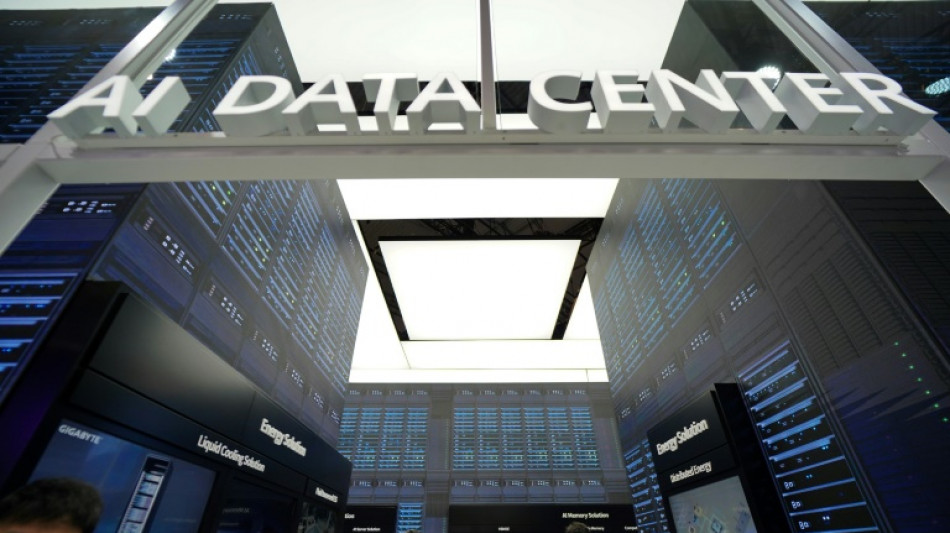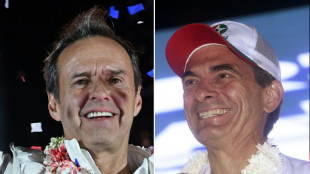
-
 Two right-wing candidates headed to Bolivia presidential run-off: projection
Two right-wing candidates headed to Bolivia presidential run-off: projection
-
'Skibidi' and 'tradwife': social media words added to Cambridge dictionary

-
 Akie Iwai joins twin sister Chisato as LPGA winner with Portland Classic triumph
Akie Iwai joins twin sister Chisato as LPGA winner with Portland Classic triumph
-
LIV's DeChambeau joins Henley and English as US Ryder Cup qualifiers

-
 No.1 Scheffler outlasts MacIntyre to win BMW Championship
No.1 Scheffler outlasts MacIntyre to win BMW Championship
-
Swiatek swamps Rybakina, to face Paolini in Cincinnati final

-
 Atletico beaten by Espanyol in La Liga opener
Atletico beaten by Espanyol in La Liga opener
-
PSG get Ligue 1 title defence off to winning start

-
 Rahm edges Niemann for LIV season title as Munoz wins at Indy
Rahm edges Niemann for LIV season title as Munoz wins at Indy
-
Seven killed in latest Ecuador pool hall shooting

-
 Mass rally in Tel Aviv calls for end to Gaza war, hostage deal
Mass rally in Tel Aviv calls for end to Gaza war, hostage deal
-
Terence Stamp: from arthouse icon to blockbuster villain

-
 World No. 3 Swiatek powers past Rybakina into Cincinnati WTA final
World No. 3 Swiatek powers past Rybakina into Cincinnati WTA final
-
Tens of thousands of Israelis protest for end to Gaza war

-
 Terence Stamp, 60s icon and Superman villain, dies
Terence Stamp, 60s icon and Superman villain, dies
-
Air Canada suspends plan to resume flights as union vows to continue strike

-
 Arsenal battle to beat Man Utd, world champions Chelsea held by Palace
Arsenal battle to beat Man Utd, world champions Chelsea held by Palace
-
Arsenal capitalise on Bayindir error to beat Man Utd

-
 'Weapons' tops North American box office for 2nd week
'Weapons' tops North American box office for 2nd week
-
Newcastle sign Ramsey from Aston Villa

-
 Terence Stamp in five films
Terence Stamp in five films
-
Terence Stamp, Superman villain and 'swinging sixties' icon, dies aged 87: UK media

-
 Chelsea draw blank in Palace stalemate
Chelsea draw blank in Palace stalemate
-
European leaders to join Zelensky in Trump meeting

-
 Hopes for survivors wane after Pakistan flooding kills hundreds
Hopes for survivors wane after Pakistan flooding kills hundreds
-
Six in a row for Marc Marquez with victory at Austrian MotoGP

-
 Spain PM vows 'climate pact' on visit to fire-hit region
Spain PM vows 'climate pact' on visit to fire-hit region
-
Serbia's president vows 'strong response' after days of unrest

-
 Brazilian goalkeeper Fabio equals Shilton record for most games played
Brazilian goalkeeper Fabio equals Shilton record for most games played
-
Warholm in confident swagger towards Tokyo worlds

-
 Air Canada to resume flights after govt directive ends strike
Air Canada to resume flights after govt directive ends strike
-
European leaders to join Zelensky in US for Ukraine talks with Trump

-
 Israelis rally nationwide calling for end to Gaza war, hostage deal
Israelis rally nationwide calling for end to Gaza war, hostage deal
-
European leaders to join Zelensky for Ukraine talks with Trump

-
 Downgraded Hurricane Erin lashes Caribbean with rain
Downgraded Hurricane Erin lashes Caribbean with rain
-
Protests held across Israel calling for end to Gaza war, hostage deal

-
 Hopes for survivors wane as landslides, flooding bury Pakistan villages
Hopes for survivors wane as landslides, flooding bury Pakistan villages
-
After deadly protests, Kenya's Ruto seeks football distraction

-
 Bolivian right eyes return in elections marked by economic crisis
Bolivian right eyes return in elections marked by economic crisis
-
Drought, dams and diplomacy: Afghanistan's water crisis goes regional

-
 'Pickypockets!' vigilante pairs with social media on London streets
'Pickypockets!' vigilante pairs with social media on London streets
-
From drought to floods, water extremes drive displacement in Afghanistan

-
 Air Canada flights grounded as government intervenes in strike
Air Canada flights grounded as government intervenes in strike
-
Women bear brunt of Afghanistan's water scarcity

-
 Reserve Messi scores in Miami win while Son gets first MLS win
Reserve Messi scores in Miami win while Son gets first MLS win
-
Japan's Iwai grabs lead at LPGA Portland Classic

-
 Trump gives Putin 'peace letter' from wife Melania
Trump gives Putin 'peace letter' from wife Melania
-
Alcaraz to face defending champ Sinner in Cincinnati ATP final

-
 Former pro-democracy Hong Kong lawmaker granted asylum in Australia
Former pro-democracy Hong Kong lawmaker granted asylum in Australia
-
SEG Announces 2025 Interim Results


Tech giants' net zero goals verging on fantasy: researchers
The credibility of climate pledges by the world's tech giants to rapidly become carbon neutral is fading fast as they devour more and more energy in the race to develop AI and build data centres, researchers warned Thursday.
Apple, Google and Meta said they would stop adding CO2 into the atmosphere by 2030, while Amazon set that target for 2040.
Microsoft promised to be "net negative" -- pulling CO2 out of the air -- by the end of this decade.
But those vows, made before the AI boom transformed the sector, are starting to look like a fantasy even as these companies have doubled down on them, according to independent analysts.
"The greenhouse gas emissions targets of tech companies appear to have lost their meaning," Thomas Hay, lead author of a report by think tanks Carbon Market Watch and NewClimate Institute, told AFP.
"If energy consumption continues to rise unchecked and without adequate oversight," he added, "these targets will likely be unachievable."
The deep-dive analysis found the overall integrity of the climate strategies at Meta, Microsoft and Amazon to be "poor", while Apple's and Microsoft's were deemed "moderate".
When it came to the quality of emissions reduction targets, those of Meta and Amazon were judged "very poor", while Google and Microsoft scored a "poor" rating. Only Apple fared better.
The expanding carbon footprint of the five top tech behemoths stems mostly from the breakneck expansion of artificial intelligence, which requires huge amounts of energy to develop and run.
Electricity consumption -- and the carbon emissions that come with it -- has doubled for some of these companies in the last three or four years, and tripled for others, the report found.
The same is true across the sector: operational emissions of the world's top 200 information technology companies was nearly 300 million tonnes of CO2 in 2023, and nearly five times that if the downstream use products and services is taken into account, according to the UN's International Telecommunications Union.
If the sector were a country, it would rank fifth in greenhouse gas emissions ahead of Brazil.
Electricity to power data centres increased on average 12 percent per year from 2017 to 2024, and is projected to double by 2030, according to the IEA.
- 'Quite unregulated' -
If all this extra power came from solar and wind, CO2 emissions would not be rising.
But despite ambitious plans to source their energy from renewables, much of it is still not carbon neutral.
Studies estimate that half of the computing capacity of tech companies' data centres comes from subcontractors, yet many companies do not account for these emissions, the study points out.
The same is true for the entire infrastructure and equipment supply chain, which accounts for at least a third of tech companies' carbon footprint.
"There is a lot of investment in renewable energy, but overall, it has not offset the sector's thirst for electricity," Day said.
Given the status of AI as a driver of economic growth, and even as a vector for industrial policy, it is unlikely that governments are going to constrain the sector's expansion, the report noted.
"So far the whole AI boom has been altogether quite unregulated," Day said.
"There are things these companies can and will do for future proofing, to make sure they're moving in the right direction" in relation to climate goals, he added.
"But when it comes to decisions that would essentially constrain the growth of the business model, we don't see any indications that that can happen without regulatory action."
The report identifies a number of ways in which the tech sector can curb its carbon footprint, even as it develops AI apace.
Ensuring that data centres -- both those belonging to the companies as well as third party partners -- run on renewable electricity is crucial.
Increasing the lifespan of devices and expanding the use of recycled components for hardware production could also make a big difference.
Finally, the methods use for calculating emissions reduction targets are out-of-date, and in need of revision, the report said.
P.Martin--AMWN